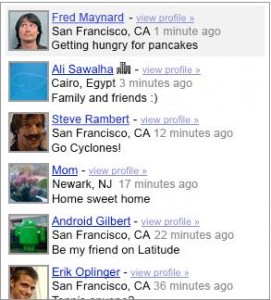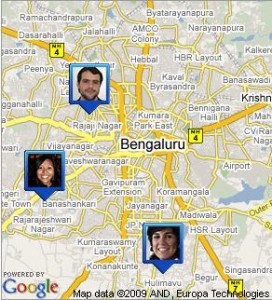Google launches ‘Latitude’
Google has launched a new feature called the ‘Latitude’ which is a feature in Google Maps for mobile and iGoogle that allows you to share your location with your friends and family. While not pinpointing your exact location, it gives you a good idea of where your friends are at a given time.
Yesterday Google announced a nifty mapping feature called Latitude, soon to be available for every major mobile phone platform that supports Google Maps. Latitude keeps track of your friends like so many tagged woodland creatures, showing you where they are on a map. But that’s not all it does–it puts a capstone on social networking technology.
Google will build Latitude into the Android platform first, incorporating it into a new software update called RC33 for existing Android phones. From there, it will be available on BlackBerrys, Java-enabled phones, Windows phones and Symbian devices, and after that, the iPhone.
For those of you that believe that GPS tracking is the signal of some kind of robot-driven apocalypse, take comfort in Google’s zealous privacy settings. Users have to manually turn on Latitude before it will broadcast their location, so no one will wake up one day with their location marked unless they mean to. Also, Google’s servers don’t track movements–they merely provide the last waypoint where a user was marked. This means that you can’t track anyone’s daily pattern of movement, making Latitude nearly useless for prospective assassins. (Breath easy, Barack.) You can also determine the specificity of your beacon, showing an exact city block or just the city itself. Only friends on your contact list can see your location.
Your list of Latitude friends works much like your Gchat friend list. You have to request to be allowed to chat with someone, and they must accept you before you can talk to them. On Latitude, there’s a little more middle ground, for the sake of social grace; you can accept someone else’s location and share back, accept their location and hide yours, deny their location or block them. You can also change privacy levels for each individual friend after you accept them by going to their Latitude profile, or for all friends by entering the “privacy” menu in your account. Once you’re up and running, you can display your location along with a Twitter-like message: “Getting lunch, come join me!” or “At the dentist, come join me!” Or something like that.

Google isn’t the first developer to provide this functionality. Orthographically anemic services like Whrll and Loopt have been doing this for a while, as has Helio with its service Buddy Beacon. But those services didn’t democratize localized buddy-mapping (as I’ll call this category of service) because they were restricted to a small pool of users with certain phones and certain carriers. What Google Latitude promises to do is nothing short of full-scale deployment of buddy-tracking for almost anyone with a halfway-decent phone.
This prospect is a milestone for several reasons. For one, Latitude is also available on desktop PC versions of Google Maps, not just in the mobile application. That means that should you choose to broadcast yourself, you’re not just telling your friends about your daily junkets, but you’re also cluing them in to the whereabouts of your computer. It used to be that an over-geeked worker could escape civilization by turning off her BlackBerry; now to unplug, she’ll be ditching the laptop, too.
PC functionality marks another benchmark in technological thought: To anyone born before, say, 1990, a “computer” meant a beige box that sat next to your desk, with a keyboard and a mouse. The day that Latitude has become worth installing on a PC is the day when “computer” has come to mean notebook, netbook, portable, tablet, or mobile workstation. Sure, laptops have been edging out desktops in sales for a couple of years now, and netbooks have created something of a PC crack boom. But with Latitude, our conversion to notebook society is complete.
Like most technological bellwethers, Latitude can also rightly be seen as a canary in the privacy coal mine. Even if Google is judicious with your personal information, it probably won’t be so generous when it comes to monetizing the location-based data it collects about you. While Google hasn’t announced any plans to integrate advertising into Latitude, you don’t have to be Al Gore to see the potential; if advertisers can tap into your location and mash it up with locations of their outlets or services and your browsing history, you’ll be hit with perhaps the most targeted ads humankind has ever known. Imagine having your mobile phone kindly inform you that you’re two blocks from your best friend, and in between you both, there lies a Starbucks where you two can meet. Depending on your viewpoint, ads could become either more useful or more invasive than ever before.
If you’re wary, Google has attempted to preempt your privacy concerns by releasing a YouTube video (below) outlining how users can keep their private information safe while using Latitude. Like social networks, blogging, and other forms of electronic communication before it, people will probably be initially skeptical. But because they’ve already come to trust Google with their communication, documents, payment information, questions, research and family photos, it won’t take long for mass adoption to become the rule.

